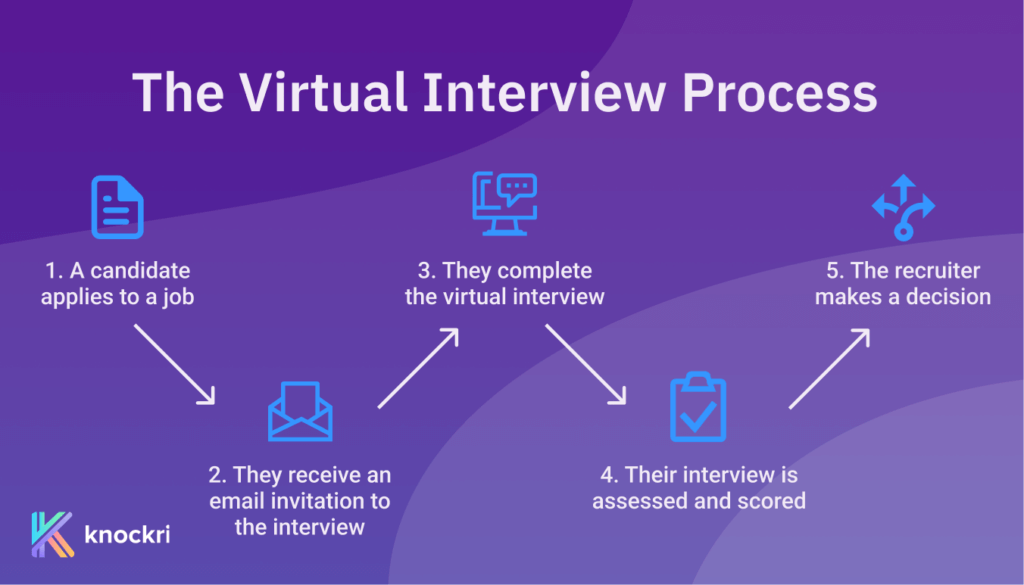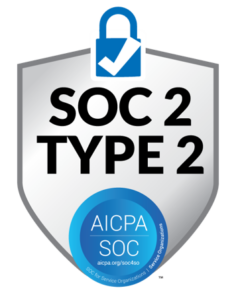Virtual interviews have become integral to many hiring processes: they can be conducted remotely and asynchronously, save time and money, are convenient for recruiters and candidates, improve candidate experience, and reduce unconscious bias in hiring.
No matter which side of the screen you’re on — as recruiter or candidate — you’ll likely encounter virtual interviews sooner rather than later. Here are eight questions about virtual interviews you’ll want to know before taking part in one.
What are virtual interviews?
Virtual interviews, also called video interviews, are remote job interviews that take place over the internet. Some companies use specialized online interview platforms, while others take place via video call software like Zoom, Skype, or Microsoft Teams.
They’re often used toward the beginning of the hiring process to screen candidates, share more about the company and role, and assess skills and competencies.
What kinds of virtual interviews are there?
Depending on the platform being used, virtual interviews can take different forms. Live video interviews on platforms like Zoom and Teams are usually a digital copy of a regular in-person interview. The recruiter can ask the candidate about their previous work experience and gain a sense of their personality.
Other interviews may take the form of skills assessments or tests that ask the candidate to perform tasks like writing or coding. These assessments may be combined with a live interview.
There are also asynchronous virtual interview platforms that mimic a traditional interview structure but allow candidates to complete them on the device and at the time of their choosing. These interviews are usually conducted on specific platforms like Knockri’s that allow for a combination of video, audio, and written responses to judge a candidate’s suitability for the role through their responses to behavior-based questions.
What is the virtual interview process?
The virtual interview workflow is generally the same, no matter the kind of interview taking place. Once a candidate applies for a job, they will receive an invitation to the virtual interview via email.
Next, they complete the virtual interview assessment or meet with a recruiter remotely. Once the interview is complete, the candidate’s entire application is reviewed by the recruiter or hiring manager, taking into account items such as the cover letter, resume, and interview. Scores from any assessments are also factored into the decision.
Finally, the recruiter decides on the candidate, either rejecting their application, moving them forward to subsequent rounds of the hiring process, or hiring them outright.
Depending on the process being used and the hiring climate, this process can take as little time as two weeks or as long as several months.

Though there are different kinds of virtual interviews, each process follows a similar workflow.
How long does a virtual interview last?
Live virtual interviews can last anywhere from 15 minutes to over an hour, depending on where in the process the candidate is, how many interviewers there are, and what is being assessed.
Virtual interview assessments on the Knockri platform average between 12 and 16 minutes, depending on the number of skills being assessed.
How do you prepare for a virtual interview?
As a candidate, preparing for a virtual interview is nearly the same as preparing for a face-to-face interview: you prep for the questions and check your route. Instead of planning your commute to the hiring location, you’ll test and familiarize yourself with the technology used.
To prepare for the question-based areas of the interview:
- Practice answering questions about why you want to join the organization, what value you would bring to the role, and why the company’s mission or culture resonates with you.
- Think of three scenarios from previous job roles and experiences that can be used to answer various situation-based questions.
- Research the company ahead of time to show initiative.
- Prepare some questions to ask the interviewer in case you’ll have the opportunity to do so. These can be anything from “What would a day-to-day routine in this role look like?” to “How did the company support employees during the pandemic?”
Virtual interviews have the added dimension of being conducted over the internet. Review the invitation materials sent by the recruiter to familiarize yourself with the process as much as possible and take advantage of any tips or FAQs provided.
Before the interview, ensure your device and internet connection are working correctly. Install any software or updates you need ahead of time, so you aren’t left scrambling.
See if you can familiarize yourself with the platform being used ahead of time — not only will this make for a smoother interview process, but it’s also essential to know how to unmute yourself and access your camera.
Test your technology to ensure your microphone and camera are working correctly. When it’s time for your interview, log in early so you can tackle any potential technical difficulties.
Why do recruiters use virtual interviews?
As a recruiter, your job is to find the best talent to fill roles in your company. Virtual interviews can speed up this process and broaden the scope of your search.
Candidates and recruiters can participate in the interviews from anywhere, cutting travel time and costs and eliminating the need to book or maintain a dedicated interview space.
You can also interview talent living outside of your immediate geographic area. This deepens your talent pool and gives you access to even more top talent to fill your roles.
What about AI-powered virtual interviews?
While recruiters and hiring managers oversee every recruitment process via virtual interview, in some cases, Artificial Intelligence (AI) can be integrated into the process to increase efficiency and reduce human bias and error.
AI-powered virtual interviews take the speed and power of a human-powered virtual interview up a notch. Instead of a recruiter having to sit down with each candidate and conduct the interview themselves, the AI platform can guide the candidate through each question and record their responses. The AI then reviews these responses and scores candidates based on a framework chosen by the hiring company.
These interviews save the hiring team time and money, letting them focus on live interactions with only the most qualified candidates they’re interested in.
What makes Knockri different?
Knockri is an AI-powered virtual interview platform, but one big difference sets us apart from other tools: how we train our AI. Instead of training our AI on historical data, the data we provide is based on industrial-organizational psychology.
Scoring is objective and looks at skills and behaviors that predict performance on the job, not characteristics like gender, race, age, or ability that might influence a human’s decision-making. This also reduces unconscious bias in hiring and can organically improve team diversity.
We also use structured behavioral interviews instead of personality tests or game-based assessments. SBIs are the most accurate interview method to predict job performance while maintaining an unbiased approach to evaluating different groups of people.
Finally, we prioritize candidate experience. Applicants want a fair and accessible interview process, so we constantly iterate and update our product to make the experience as smooth as possible. Assessments for every candidate are consistent, comparable, and fair, and they’re also customizable to the hiring company’s branding to provide the best experience.
Book a demo to chat with our HR Solutions Consultant to learn more about virtual interviews and how Knockri is changing the online recruitment game.



